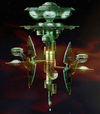Jenatris Cloud
| Par'tha Geography | ||
|---|---|---|

| ||
| Spatial Phenomena | ||

|
Jenatris Cloud | |

|
Rintani Nebula | |

|
Norlian Nebula | |
| Jenatris Corridor | Siiden Passage | |
| K'tem Hyperlane | ||
| Planets and Systems | ||
| Points of Interest | ||
| Aelann Imperial Shipyards | Midway Station | |
| Jirissa Gardens | Lastelle Island | |

|
Deep Space 26 | |

|
Shemsh | |

|
Outpost Ganzera | |
| Neighboring Regions | ||
| VIR | UFP | |
| RSE | Solerian Sector | |
|
| ||
The Jenatris Cloud was discovered several hundred years ago by Hanol Jenatris, an astronomer from Alpha Centauri. The Cloud is really a combination of hundreds of small nebulae and odd subspace anomalies concentrated within this area of space for some as yet undiscovered reason. Various types of radiation and subspace friction make the Cloud prone to plasma and ion storms, causing it to be an incredibly dangerous place to be, many times worse than the Badlands area near Bajor. The density of particles present, the radiation, and the storms also make the Cloud virtually impossible to traverse. Sensors will only function up to a couple hundred meters, raising shields is impossible, and communications have a zero range. Warp fields also will not form, so travel within the Cloud is limited to impulse power and thrusters. Thankfully for those wishing to travel through the Cloud, the Jenatris Corridor (though slightly indirect) does run from the Federation side of the Cloud to the opposite side.
The Cloud, although a dangerous place to be, is thought by many to be a place of incredible beauty. Hues of gold predominate, with strands of fuchsia and royal blue, and other soft colors accenting and highlighting the swirling mass of particles and gases. The internal storms add a subtle sparkle, which gives some people the impression that the Cloud is almost alive.
Recent travel of the USS Atlantis revealed an abnormal behaviour of the gases of the Jenatris Cloud. Those gases proved to be mutating constantly and one of this mutations was able to breach the hull and enter the ship. The mutation continued and affected the crew making inhibitions fade a way a little. Science teams with an engineering team in enviro-suits were able to fix the breach and vent the gas away. Further scans on a sample proved that out of the cloud small portions of the gases decay to inert compounds within hours. Current hypothesis is that something within the nebulous cloud keeps the gases mutating.